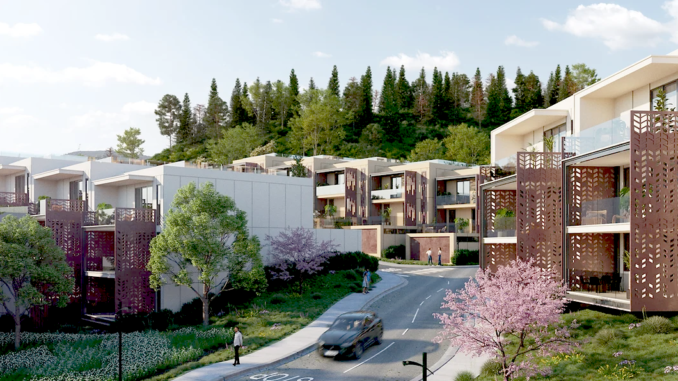
BY EMILY MIBACH
Daily Post Staff Writer
The developer behind two controversial developments in San Carlos — one on Black Mountain and the other downtown — has gone belly up, leaving the fate of both projects uncertain.
Veev Group, which specialized in prefabricated housing, got approval from San Carlos officials in May to build a controversial new neighborhood on Black Mountain. The company was planning to build 87 townhouses on the hillside between Madera Avenue and Melendy Drive. The project received pushback from residents, who were worried about the increase in traffic on Alameda de las Pulgas, the project’s “box-like” design, over 200 trees needing to be cut down and the potential of mudslides.
Nancy O’Rourke, who lives downhill from the project at 808 Alameda, said the neighborhood is curious about the property’s fate. O’Rourke and other downhill neighbors had serious concerns that water from the aquifers under the old Black Mountain Spring Water bottling plant would cause water to seep into their homes if not dealt with carefully.
O’Rourke said she wouldn’t mind seeing the property become a park, or even a smaller development being built up there. She said it seems like the terrain on Black Mountain would not be amenable to a large development.
The 808 Alameda project was proposed by the developer after residents in 2015 voted down a bond measure that would have taxed residents $90 million over 30 years so the city could buy the land and create a 25-acre park. After the measure failed, Veev, then known as Dragonfly Group and another development company bought the two properties the city could have bought if the bond was successful.
Vice Mayor John Dugan said the community had the opportunity to buy the land and chose to leave it zoned for housing. He said while he wouldn’t oppose seeing a park there, he thinks realistically Veev will sell the property and another developer will come in and continue the development.
City Manager Jeff Maltbie said the city has tried to contact Veev but hasn’t gotten any response. The approval for the project lasts for two years. This means another developer can buy the property and build the approved project, but it has a tight timeline to do so.
Former San Carlos Mayor Mark Olbert said he sees the Black Mountain property getting bought by another developer, but noted that developers often want to “implement their own visions,” and hypothesized anyone who buys the property may put forward new plans, further delaying any development happening there.
“But I am sure a few people would prefer it that way,” Olbert said.
Olbert also said part of the opposition to the bond measure was that residents were told it was unlikely large projects would be proposed on the hillside.
The other project that Veev’s closure has left in the lurch is one for 626 Walnut St., which was approved by officials in June 2020. It would have been the tallest building downtown. The five-story project would have consisted of 35 condos and two ground-floor retail spaces and would have been 72 feet high, the tallest building downtown, but not the entire city.
The property is for sale and was posted on various real estate websites late last month.
The San Mateo County Board of Supervisors is set to discuss the property behind closed doors tomorrow. The board will discuss “price and terms of payment,” according to the board’s agenda.
Assistant County Attorney Rebecca Archer said the property has not been discussed by the Supervisors before. The board may decide to tell Archer to pursue buying the land.
Developer Veev was founded in 2008 by a group of technology entrepreneurs, including Amit Haller, Ami Avrahami and Dafna Akiva, according to the company’s website. Its headquarters are in Hayward and it has an office in Tel Aviv, Israel. The company announced at the end of November that it was closing after its latest round of investor funding fell through.
The company had raised $400 million from investors about a year and a half ago. Dugan, San Carlos’ vice mayor, said Veev’s closure was surprising to him given the funds they’ve raised previously.
The company tried to cut down on the time spent building homes by having parts of the home pre-constructed before bringing them to the construction site. Veev CEO Amit Haller told the Associated Press that it takes about five employees to construct a home. Haller had given the AP an interview about the company just two weeks before it shut down.
The Post reached out to Veev last week to find out about the future of the San Carlos sites but received no response.
